Essay on Overriding Interests in Registered Land: LAA202 Land Law 1
VerifiedAdded on 2023/05/28
|6
|1881
|101
Essay
AI Summary
This essay critically evaluates the role of overriding interests in dealings with registered land. It begins by defining overriding interests and explaining their significance in the context of registered conveyancing, where the rights of land owners are typically recorded. The essay explores the Land Registration Act 2002 and the Land Registration Rules 2003, highlighting their impact on overriding interests. It discusses the historical context, including the Law of Property Act 1925, and the evolution of these interests. The essay differentiates between minor and overriding interests, examines relevant case law, and considers the government's efforts to reduce the number of overriding interests while maintaining the completeness of the land registry. The conclusion emphasizes the importance of evaluating overriding interests to protect the rights of parties involved in land transactions.

0 | P a g e
Land Law
Land Law
Paraphrase This Document
Need a fresh take? Get an instant paraphrase of this document with our AI Paraphraser
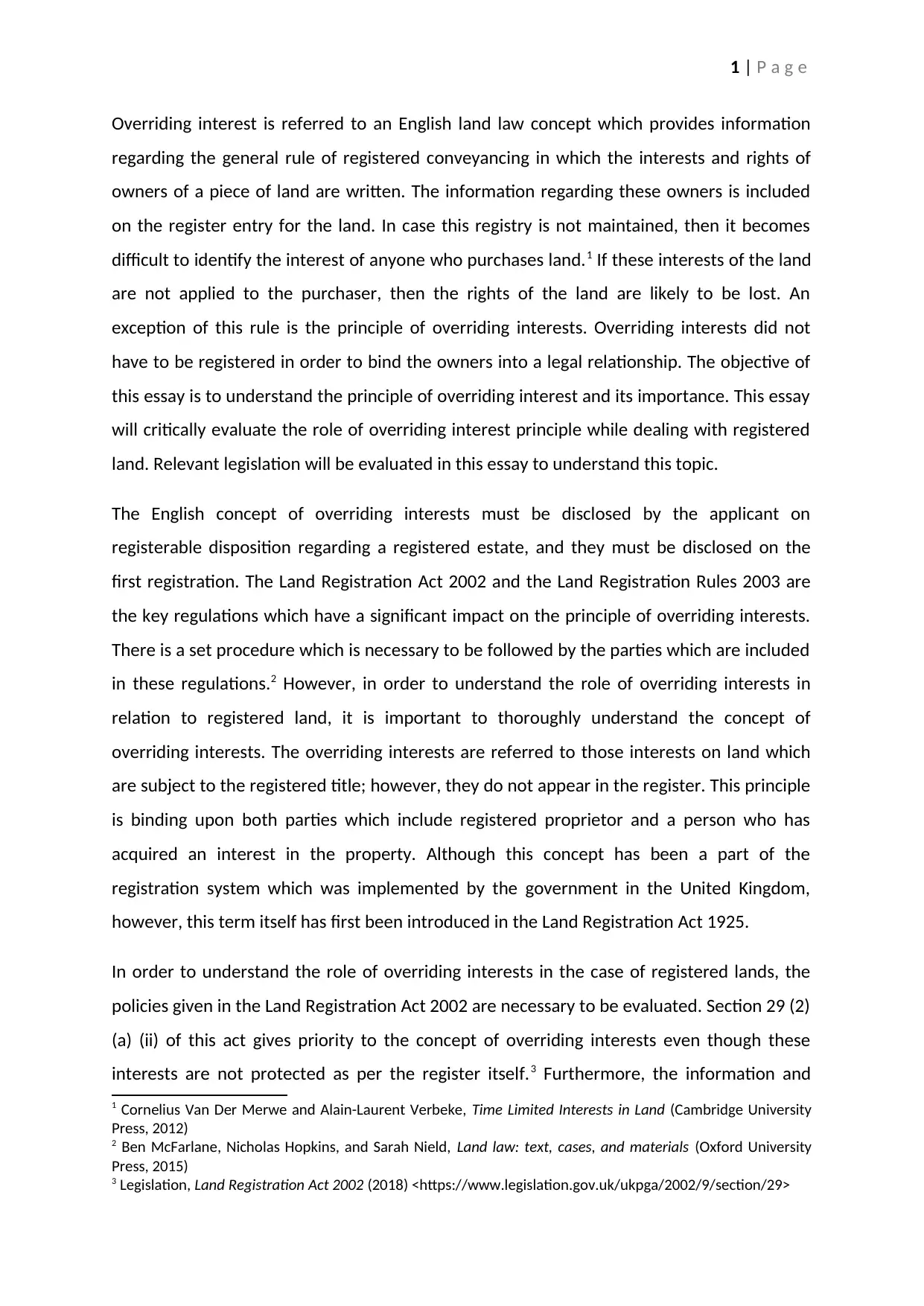
1 | P a g e
Overriding interest is referred to an English land law concept which provides information
regarding the general rule of registered conveyancing in which the interests and rights of
owners of a piece of land are written. The information regarding these owners is included
on the register entry for the land. In case this registry is not maintained, then it becomes
difficult to identify the interest of anyone who purchases land.1 If these interests of the land
are not applied to the purchaser, then the rights of the land are likely to be lost. An
exception of this rule is the principle of overriding interests. Overriding interests did not
have to be registered in order to bind the owners into a legal relationship. The objective of
this essay is to understand the principle of overriding interest and its importance. This essay
will critically evaluate the role of overriding interest principle while dealing with registered
land. Relevant legislation will be evaluated in this essay to understand this topic.
The English concept of overriding interests must be disclosed by the applicant on
registerable disposition regarding a registered estate, and they must be disclosed on the
first registration. The Land Registration Act 2002 and the Land Registration Rules 2003 are
the key regulations which have a significant impact on the principle of overriding interests.
There is a set procedure which is necessary to be followed by the parties which are included
in these regulations.2 However, in order to understand the role of overriding interests in
relation to registered land, it is important to thoroughly understand the concept of
overriding interests. The overriding interests are referred to those interests on land which
are subject to the registered title; however, they do not appear in the register. This principle
is binding upon both parties which include registered proprietor and a person who has
acquired an interest in the property. Although this concept has been a part of the
registration system which was implemented by the government in the United Kingdom,
however, this term itself has first been introduced in the Land Registration Act 1925.
In order to understand the role of overriding interests in the case of registered lands, the
policies given in the Land Registration Act 2002 are necessary to be evaluated. Section 29 (2)
(a) (ii) of this act gives priority to the concept of overriding interests even though these
interests are not protected as per the register itself.3 Furthermore, the information and
1 Cornelius Van Der Merwe and Alain-Laurent Verbeke, Time Limited Interests in Land (Cambridge University
Press, 2012)
2 Ben McFarlane, Nicholas Hopkins, and Sarah Nield, Land law: text, cases, and materials (Oxford University
Press, 2015)
3 Legislation, Land Registration Act 2002 (2018) <https://www.legislation.gov.uk/ukpga/2002/9/section/29>
Overriding interest is referred to an English land law concept which provides information
regarding the general rule of registered conveyancing in which the interests and rights of
owners of a piece of land are written. The information regarding these owners is included
on the register entry for the land. In case this registry is not maintained, then it becomes
difficult to identify the interest of anyone who purchases land.1 If these interests of the land
are not applied to the purchaser, then the rights of the land are likely to be lost. An
exception of this rule is the principle of overriding interests. Overriding interests did not
have to be registered in order to bind the owners into a legal relationship. The objective of
this essay is to understand the principle of overriding interest and its importance. This essay
will critically evaluate the role of overriding interest principle while dealing with registered
land. Relevant legislation will be evaluated in this essay to understand this topic.
The English concept of overriding interests must be disclosed by the applicant on
registerable disposition regarding a registered estate, and they must be disclosed on the
first registration. The Land Registration Act 2002 and the Land Registration Rules 2003 are
the key regulations which have a significant impact on the principle of overriding interests.
There is a set procedure which is necessary to be followed by the parties which are included
in these regulations.2 However, in order to understand the role of overriding interests in
relation to registered land, it is important to thoroughly understand the concept of
overriding interests. The overriding interests are referred to those interests on land which
are subject to the registered title; however, they do not appear in the register. This principle
is binding upon both parties which include registered proprietor and a person who has
acquired an interest in the property. Although this concept has been a part of the
registration system which was implemented by the government in the United Kingdom,
however, this term itself has first been introduced in the Land Registration Act 1925.
In order to understand the role of overriding interests in the case of registered lands, the
policies given in the Land Registration Act 2002 are necessary to be evaluated. Section 29 (2)
(a) (ii) of this act gives priority to the concept of overriding interests even though these
interests are not protected as per the register itself.3 Furthermore, the information and
1 Cornelius Van Der Merwe and Alain-Laurent Verbeke, Time Limited Interests in Land (Cambridge University
Press, 2012)
2 Ben McFarlane, Nicholas Hopkins, and Sarah Nield, Land law: text, cases, and materials (Oxford University
Press, 2015)
3 Legislation, Land Registration Act 2002 (2018) <https://www.legislation.gov.uk/ukpga/2002/9/section/29>
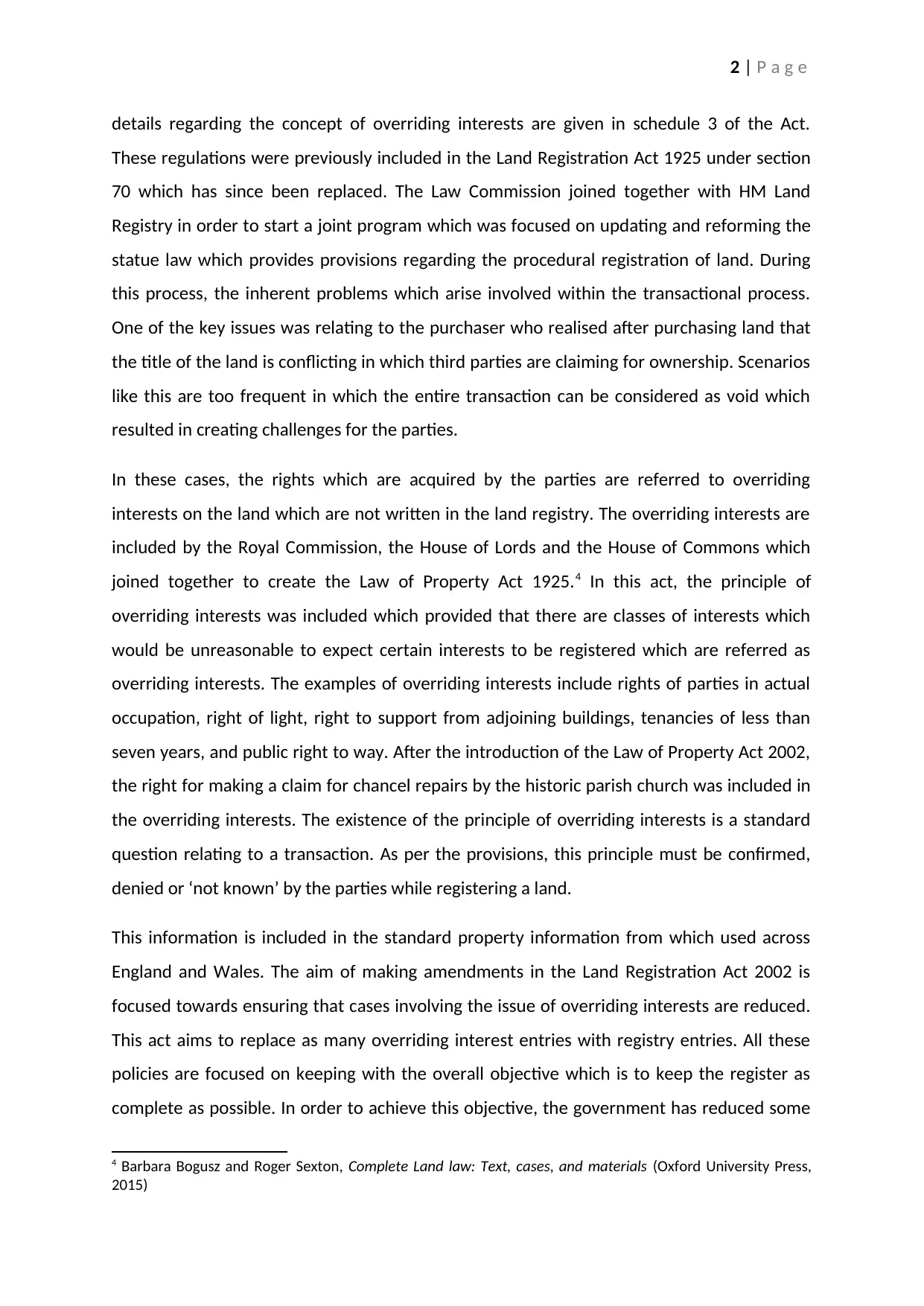
2 | P a g e
details regarding the concept of overriding interests are given in schedule 3 of the Act.
These regulations were previously included in the Land Registration Act 1925 under section
70 which has since been replaced. The Law Commission joined together with HM Land
Registry in order to start a joint program which was focused on updating and reforming the
statue law which provides provisions regarding the procedural registration of land. During
this process, the inherent problems which arise involved within the transactional process.
One of the key issues was relating to the purchaser who realised after purchasing land that
the title of the land is conflicting in which third parties are claiming for ownership. Scenarios
like this are too frequent in which the entire transaction can be considered as void which
resulted in creating challenges for the parties.
In these cases, the rights which are acquired by the parties are referred to overriding
interests on the land which are not written in the land registry. The overriding interests are
included by the Royal Commission, the House of Lords and the House of Commons which
joined together to create the Law of Property Act 1925.4 In this act, the principle of
overriding interests was included which provided that there are classes of interests which
would be unreasonable to expect certain interests to be registered which are referred as
overriding interests. The examples of overriding interests include rights of parties in actual
occupation, right of light, right to support from adjoining buildings, tenancies of less than
seven years, and public right to way. After the introduction of the Law of Property Act 2002,
the right for making a claim for chancel repairs by the historic parish church was included in
the overriding interests. The existence of the principle of overriding interests is a standard
question relating to a transaction. As per the provisions, this principle must be confirmed,
denied or ‘not known’ by the parties while registering a land.
This information is included in the standard property information from which used across
England and Wales. The aim of making amendments in the Land Registration Act 2002 is
focused towards ensuring that cases involving the issue of overriding interests are reduced.
This act aims to replace as many overriding interest entries with registry entries. All these
policies are focused on keeping with the overall objective which is to keep the register as
complete as possible. In order to achieve this objective, the government has reduced some
4 Barbara Bogusz and Roger Sexton, Complete Land law: Text, cases, and materials (Oxford University Press,
2015)
details regarding the concept of overriding interests are given in schedule 3 of the Act.
These regulations were previously included in the Land Registration Act 1925 under section
70 which has since been replaced. The Law Commission joined together with HM Land
Registry in order to start a joint program which was focused on updating and reforming the
statue law which provides provisions regarding the procedural registration of land. During
this process, the inherent problems which arise involved within the transactional process.
One of the key issues was relating to the purchaser who realised after purchasing land that
the title of the land is conflicting in which third parties are claiming for ownership. Scenarios
like this are too frequent in which the entire transaction can be considered as void which
resulted in creating challenges for the parties.
In these cases, the rights which are acquired by the parties are referred to overriding
interests on the land which are not written in the land registry. The overriding interests are
included by the Royal Commission, the House of Lords and the House of Commons which
joined together to create the Law of Property Act 1925.4 In this act, the principle of
overriding interests was included which provided that there are classes of interests which
would be unreasonable to expect certain interests to be registered which are referred as
overriding interests. The examples of overriding interests include rights of parties in actual
occupation, right of light, right to support from adjoining buildings, tenancies of less than
seven years, and public right to way. After the introduction of the Law of Property Act 2002,
the right for making a claim for chancel repairs by the historic parish church was included in
the overriding interests. The existence of the principle of overriding interests is a standard
question relating to a transaction. As per the provisions, this principle must be confirmed,
denied or ‘not known’ by the parties while registering a land.
This information is included in the standard property information from which used across
England and Wales. The aim of making amendments in the Land Registration Act 2002 is
focused towards ensuring that cases involving the issue of overriding interests are reduced.
This act aims to replace as many overriding interest entries with registry entries. All these
policies are focused on keeping with the overall objective which is to keep the register as
complete as possible. In order to achieve this objective, the government has reduced some
4 Barbara Bogusz and Roger Sexton, Complete Land law: Text, cases, and materials (Oxford University Press,
2015)
⊘ This is a preview!⊘
Do you want full access?
Subscribe today to unlock all pages.

Trusted by 1+ million students worldwide
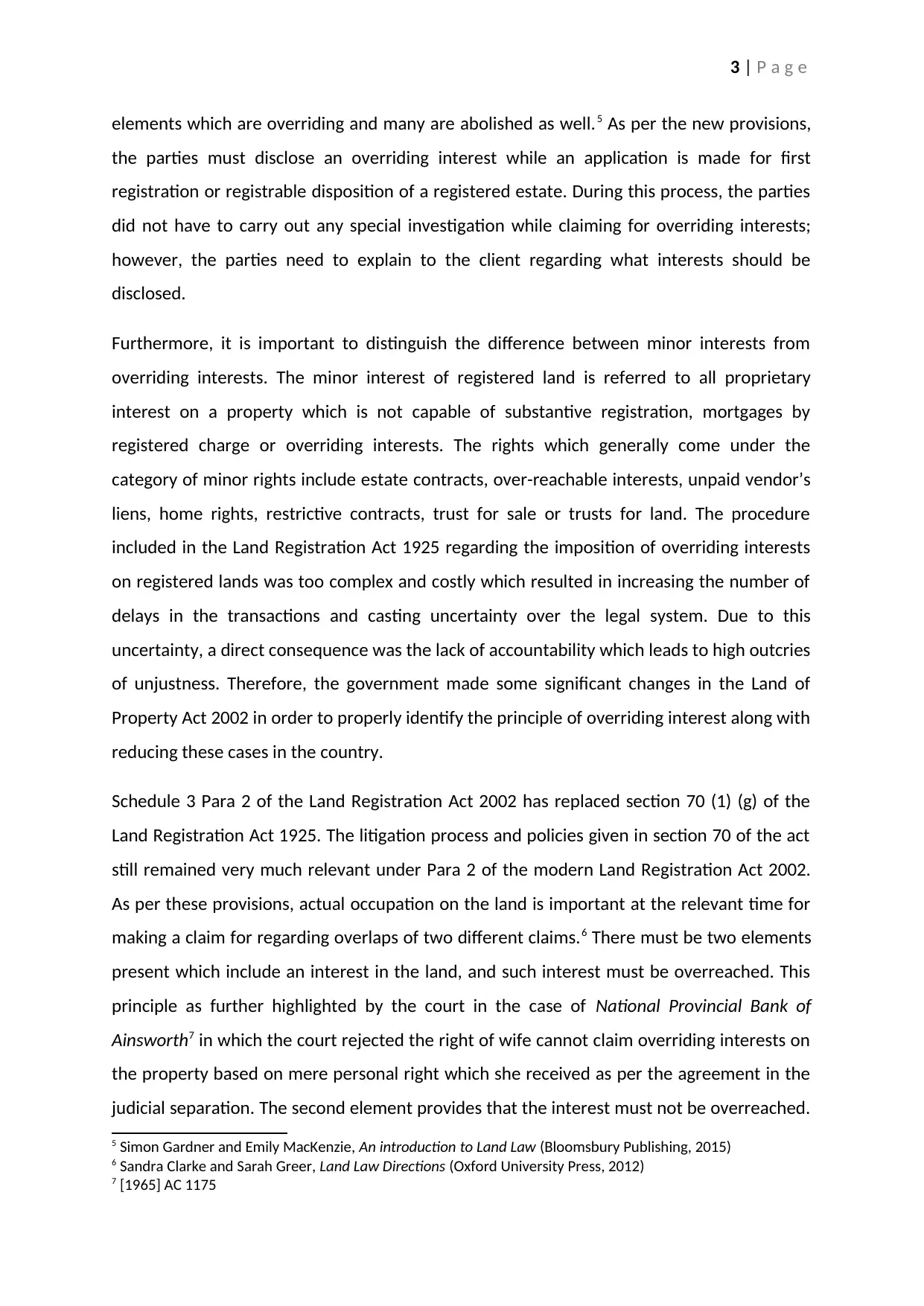
3 | P a g e
elements which are overriding and many are abolished as well.5 As per the new provisions,
the parties must disclose an overriding interest while an application is made for first
registration or registrable disposition of a registered estate. During this process, the parties
did not have to carry out any special investigation while claiming for overriding interests;
however, the parties need to explain to the client regarding what interests should be
disclosed.
Furthermore, it is important to distinguish the difference between minor interests from
overriding interests. The minor interest of registered land is referred to all proprietary
interest on a property which is not capable of substantive registration, mortgages by
registered charge or overriding interests. The rights which generally come under the
category of minor rights include estate contracts, over-reachable interests, unpaid vendor’s
liens, home rights, restrictive contracts, trust for sale or trusts for land. The procedure
included in the Land Registration Act 1925 regarding the imposition of overriding interests
on registered lands was too complex and costly which resulted in increasing the number of
delays in the transactions and casting uncertainty over the legal system. Due to this
uncertainty, a direct consequence was the lack of accountability which leads to high outcries
of unjustness. Therefore, the government made some significant changes in the Land of
Property Act 2002 in order to properly identify the principle of overriding interest along with
reducing these cases in the country.
Schedule 3 Para 2 of the Land Registration Act 2002 has replaced section 70 (1) (g) of the
Land Registration Act 1925. The litigation process and policies given in section 70 of the act
still remained very much relevant under Para 2 of the modern Land Registration Act 2002.
As per these provisions, actual occupation on the land is important at the relevant time for
making a claim for regarding overlaps of two different claims.6 There must be two elements
present which include an interest in the land, and such interest must be overreached. This
principle as further highlighted by the court in the case of National Provincial Bank of
Ainsworth7 in which the court rejected the right of wife cannot claim overriding interests on
the property based on mere personal right which she received as per the agreement in the
judicial separation. The second element provides that the interest must not be overreached.
5 Simon Gardner and Emily MacKenzie, An introduction to Land Law (Bloomsbury Publishing, 2015)
6 Sandra Clarke and Sarah Greer, Land Law Directions (Oxford University Press, 2012)
7 [1965] AC 1175
elements which are overriding and many are abolished as well.5 As per the new provisions,
the parties must disclose an overriding interest while an application is made for first
registration or registrable disposition of a registered estate. During this process, the parties
did not have to carry out any special investigation while claiming for overriding interests;
however, the parties need to explain to the client regarding what interests should be
disclosed.
Furthermore, it is important to distinguish the difference between minor interests from
overriding interests. The minor interest of registered land is referred to all proprietary
interest on a property which is not capable of substantive registration, mortgages by
registered charge or overriding interests. The rights which generally come under the
category of minor rights include estate contracts, over-reachable interests, unpaid vendor’s
liens, home rights, restrictive contracts, trust for sale or trusts for land. The procedure
included in the Land Registration Act 1925 regarding the imposition of overriding interests
on registered lands was too complex and costly which resulted in increasing the number of
delays in the transactions and casting uncertainty over the legal system. Due to this
uncertainty, a direct consequence was the lack of accountability which leads to high outcries
of unjustness. Therefore, the government made some significant changes in the Land of
Property Act 2002 in order to properly identify the principle of overriding interest along with
reducing these cases in the country.
Schedule 3 Para 2 of the Land Registration Act 2002 has replaced section 70 (1) (g) of the
Land Registration Act 1925. The litigation process and policies given in section 70 of the act
still remained very much relevant under Para 2 of the modern Land Registration Act 2002.
As per these provisions, actual occupation on the land is important at the relevant time for
making a claim for regarding overlaps of two different claims.6 There must be two elements
present which include an interest in the land, and such interest must be overreached. This
principle as further highlighted by the court in the case of National Provincial Bank of
Ainsworth7 in which the court rejected the right of wife cannot claim overriding interests on
the property based on mere personal right which she received as per the agreement in the
judicial separation. The second element provides that the interest must not be overreached.
5 Simon Gardner and Emily MacKenzie, An introduction to Land Law (Bloomsbury Publishing, 2015)
6 Sandra Clarke and Sarah Greer, Land Law Directions (Oxford University Press, 2012)
7 [1965] AC 1175
Paraphrase This Document
Need a fresh take? Get an instant paraphrase of this document with our AI Paraphraser
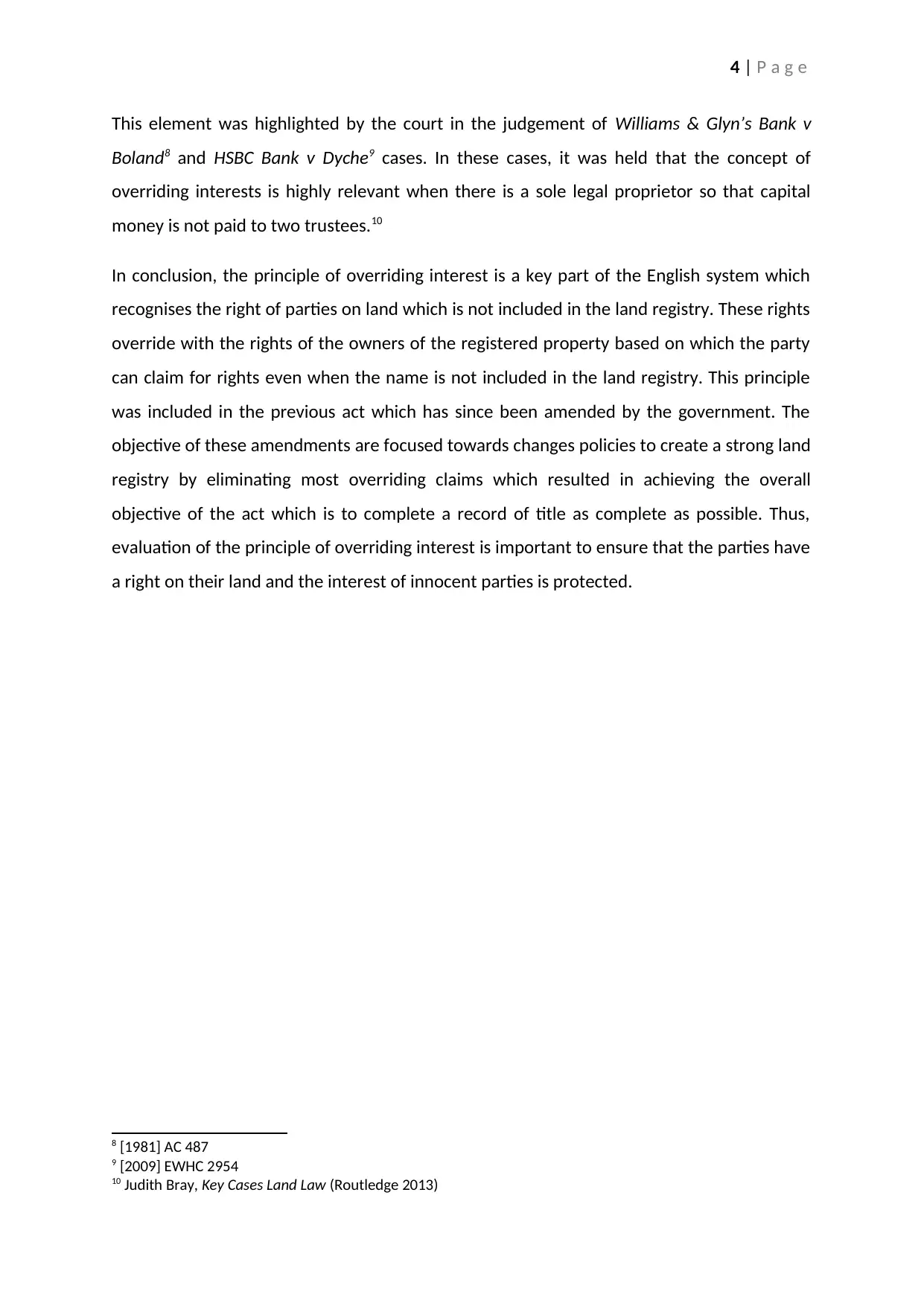
4 | P a g e
This element was highlighted by the court in the judgement of Williams & Glyn’s Bank v
Boland8 and HSBC Bank v Dyche9 cases. In these cases, it was held that the concept of
overriding interests is highly relevant when there is a sole legal proprietor so that capital
money is not paid to two trustees.10
In conclusion, the principle of overriding interest is a key part of the English system which
recognises the right of parties on land which is not included in the land registry. These rights
override with the rights of the owners of the registered property based on which the party
can claim for rights even when the name is not included in the land registry. This principle
was included in the previous act which has since been amended by the government. The
objective of these amendments are focused towards changes policies to create a strong land
registry by eliminating most overriding claims which resulted in achieving the overall
objective of the act which is to complete a record of title as complete as possible. Thus,
evaluation of the principle of overriding interest is important to ensure that the parties have
a right on their land and the interest of innocent parties is protected.
8 [1981] AC 487
9 [2009] EWHC 2954
10 Judith Bray, Key Cases Land Law (Routledge 2013)
This element was highlighted by the court in the judgement of Williams & Glyn’s Bank v
Boland8 and HSBC Bank v Dyche9 cases. In these cases, it was held that the concept of
overriding interests is highly relevant when there is a sole legal proprietor so that capital
money is not paid to two trustees.10
In conclusion, the principle of overriding interest is a key part of the English system which
recognises the right of parties on land which is not included in the land registry. These rights
override with the rights of the owners of the registered property based on which the party
can claim for rights even when the name is not included in the land registry. This principle
was included in the previous act which has since been amended by the government. The
objective of these amendments are focused towards changes policies to create a strong land
registry by eliminating most overriding claims which resulted in achieving the overall
objective of the act which is to complete a record of title as complete as possible. Thus,
evaluation of the principle of overriding interest is important to ensure that the parties have
a right on their land and the interest of innocent parties is protected.
8 [1981] AC 487
9 [2009] EWHC 2954
10 Judith Bray, Key Cases Land Law (Routledge 2013)
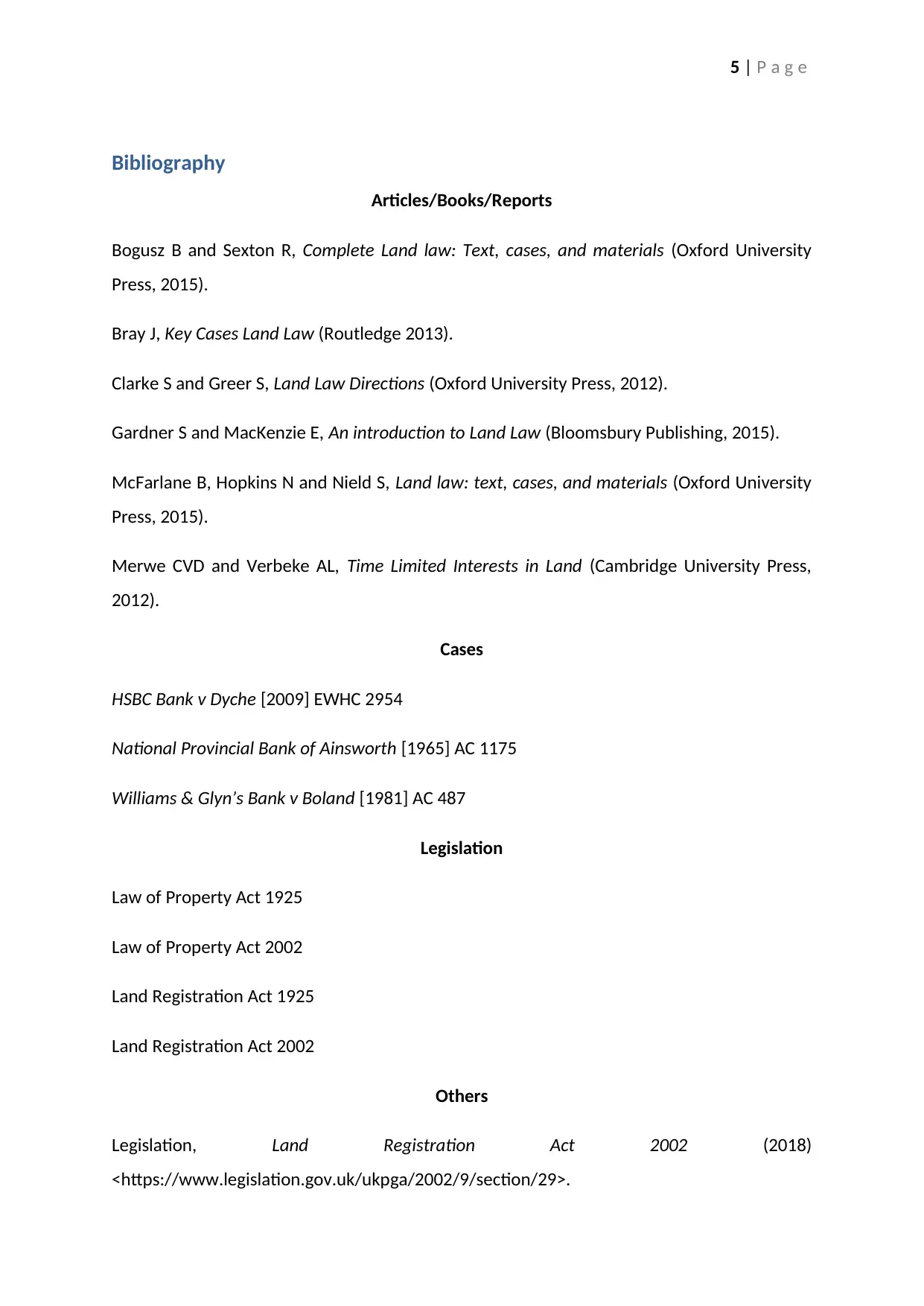
5 | P a g e
Bibliography
Articles/Books/Reports
Bogusz B and Sexton R, Complete Land law: Text, cases, and materials (Oxford University
Press, 2015).
Bray J, Key Cases Land Law (Routledge 2013).
Clarke S and Greer S, Land Law Directions (Oxford University Press, 2012).
Gardner S and MacKenzie E, An introduction to Land Law (Bloomsbury Publishing, 2015).
McFarlane B, Hopkins N and Nield S, Land law: text, cases, and materials (Oxford University
Press, 2015).
Merwe CVD and Verbeke AL, Time Limited Interests in Land (Cambridge University Press,
2012).
Cases
HSBC Bank v Dyche [2009] EWHC 2954
National Provincial Bank of Ainsworth [1965] AC 1175
Williams & Glyn’s Bank v Boland [1981] AC 487
Legislation
Law of Property Act 1925
Law of Property Act 2002
Land Registration Act 1925
Land Registration Act 2002
Others
Legislation, Land Registration Act 2002 (2018)
<https://www.legislation.gov.uk/ukpga/2002/9/section/29>.
Bibliography
Articles/Books/Reports
Bogusz B and Sexton R, Complete Land law: Text, cases, and materials (Oxford University
Press, 2015).
Bray J, Key Cases Land Law (Routledge 2013).
Clarke S and Greer S, Land Law Directions (Oxford University Press, 2012).
Gardner S and MacKenzie E, An introduction to Land Law (Bloomsbury Publishing, 2015).
McFarlane B, Hopkins N and Nield S, Land law: text, cases, and materials (Oxford University
Press, 2015).
Merwe CVD and Verbeke AL, Time Limited Interests in Land (Cambridge University Press,
2012).
Cases
HSBC Bank v Dyche [2009] EWHC 2954
National Provincial Bank of Ainsworth [1965] AC 1175
Williams & Glyn’s Bank v Boland [1981] AC 487
Legislation
Law of Property Act 1925
Law of Property Act 2002
Land Registration Act 1925
Land Registration Act 2002
Others
Legislation, Land Registration Act 2002 (2018)
<https://www.legislation.gov.uk/ukpga/2002/9/section/29>.
⊘ This is a preview!⊘
Do you want full access?
Subscribe today to unlock all pages.

Trusted by 1+ million students worldwide
1 out of 6
Related Documents
Your All-in-One AI-Powered Toolkit for Academic Success.
+13062052269
info@desklib.com
Available 24*7 on WhatsApp / Email
![[object Object]](/_next/static/media/star-bottom.7253800d.svg)
Unlock your academic potential
Copyright © 2020–2026 A2Z Services. All Rights Reserved. Developed and managed by ZUCOL.





